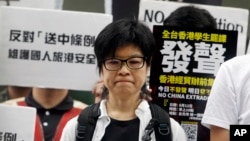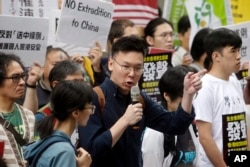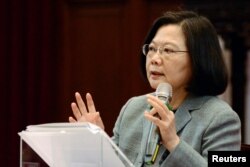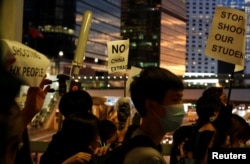Not long after street demonstrators massed in Hong Kong this week to protest a controversial extradition bill that would allow criminal suspects to be sent to mainland China for trial, Taiwan’s president, her ruling party and two of her government ministries voiced emphatic support for the demonstrators.
Taiwanese officials, who normally avoid taking sides in political issues offshore, back the protest’s underlying cause of squelching the expansion of rule by China. Beijing gained control of Hong Kong in 1997 and hopes someday to rule Taiwan the same way, which it calls “one country, two systems.”
Officials in Taipei jumped into the Hong Kong fray to show they’re in tune with China-leery public sentiment at home, especially ahead of elections, analysts say.
“I believe that Taiwanese people, regardless of whether in the majority or minority political camps, will feel increasing dissatisfaction toward the Chinese government’s actions that could be directed at Taiwan,” said Michael Tsai, chairman of the Institute for Taiwan Defense and Strategic Studies in Taiwan.
In the first show of support, the ruling Democratic Progressive Party weighed in Monday by calling the “one country, two systems” approach “the demise of democracy and freedom.” The demonstrations began Sunday.
China and the now democratically governed Taiwan have been separately ruled for seven decades. According to a government poll conducted in January more than 80% of Taiwanese oppose any Chinese rule on their island.
China still claims sovereignty over Taiwan, where the Nationalists re-established their government in the 1940s after losing the Chinese civil war to Mao Zedong’s Communists. China has vowed to press for eventual unification.
Statements from Taiwan
Taiwan Foreign Minister Joseph Wu tweeted Wednesday that he would “stand shoulder to shoulder with the hundreds of thousands in Hong Kong fighting the extradition bill and for rule of law.”
Street demonstrations began Sunday with hundreds of thousands protesting a proposed law that would let Hong Kong extradite criminal suspects to mainland China, among other places. Authorities in Beijing sometimes prosecute acts of free expression and assembly. Their sentences can be harsher than Hong Kong’s, and the legal system less transparent.
Under the “two systems” scheme, China has said it would offer Hong Kong a degree of autonomy.
On Thursday, Taiwan President Tsai Ing-wen sent her secretary general to meet a group of protest-sympathetic Hong Kong students in Taipei hours after demonstrators in Hong Kong clashed with tear gas-wielding police.
“What Taiwanese feel most deeply about this is that ‘one country, two systems’ is not viable and not acceptable for a democratic Taiwan,” Tsai told reporters Thursday.
“I think, hopefully, the kind of words given on the part of President Tsai is a kind of mouthpiece from the government perspective to try to defend the Taiwanese interests,” said Liu Yih-jiun, a public affairs professor at Fo Guang University in Taiwan.
Also Thursday, the Taiwan government’s Mainland Affairs Council said no one in politics could support the proposed legal change in Hong Kong.
“The president, the premier, all political circles whether in power or not have repeatedly expressed our concern and support, and we emphasize that we will not be an accomplice to an evil law,” council spokesman Chiu Chui-cheng told a news conference Thursday. “We especially feel deep regret that the citizens boldly resisting that law encountered violence by the police.”
Hong Kong’s proposed law started with Taiwan, too. Last year a 19-year-old Hong Kong man was suspected of killing his girlfriend on a trip to Taiwan and then fleeing home. The two sides have no extradition treaty, but Hong Kong authorities hope the proposed law would let them extradite the suspect to Taiwan for prosecution.
Eyes on Taiwan presidential race
Taiwanese officials may be backing Hong Kong’s protesters to stand out in elections scheduled for January. They want to be seen as tough against China in keeping with local voter sentiment, experts on the island say. Taiwanese will elect a president and parliament.
Tsai Ing-wen is expected to receive her party’s nomination next week to run against an opposition Nationalist Party candidate who will probably advocate stronger economic ties with Beijing. Many Taiwanese want tighter economic relations, but without political concessions.
Positions taken on Hong Kong “will affect the election next year, at least to some people,” said Alex Chiang, an international relations professor at National Chengchi University in Taipei. “They will support pro-independence candidates or at least candidates who take a stronger position against China.”
To avoid putting anti-Beijing people in office in Taipei, China will strive for a “peaceful resolution with the Hong Kong people” to show it can harmonize with a population rather than using only its authoritarian rule to stop protests, Liu said.







